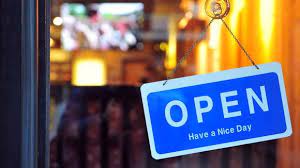Following the updates to COVID 19 restrictions brought in on 17 May, most businesses not identified as high risk are allowed to reopen partially, with many being allowed to reopen fully. As the country continues taking steps toward a return to normal, COVID restrictions remain in place in order to allow the reopening process to be conducted as safely as possible.
John McGrath, Legal Adviser at DAS Law, tells you what you need to know…
• What are the safety guidelines surrounding businesses fully re-opening to customers?
A business that is preparing to, or has recently reopened should ensure that a full COVID risk assessment has been conducted in order to identify any areas that may need precautions to be implemented in order to protect your employees or customers. This should also help venues identify where to implement frequent cleaning and what PPE should be required and provided for staff.
Restrictions are sector specific so it is very important for businesses to be aware of the relevant guidance. Face masks are still required in most indoor places, however customers of hospitality venues may remove them once seated for the purposes of eating and drinking, they may also be removed if needed for the service to be carried out, such as for facials or dentistry. Exceptions also apply if you are undertaking exercise or an activity where wearing a mask would negatively impact your ability to undertake them.
It is important to keep in mind that a business must provide a safe environment for all its staff and customers. This is at the core of what you are aiming to achieve.
Venues should consider any alterations to their entrances to minimise risk, allow social distancing and to comply with any relevant COVID regulations, such as displaying the track and trace QR details or collecting information without causing unnecessary exposure or bottlenecks. Other measures to consider are implementing fixed teams, how to maintain social distancing and minimising unnecessary close contact.
Employee training and/or orientation should be useful to update them on new rules and procedures so they can keep themselves and customers safe. If any concerns are raised make sure to discuss them in order to identify any underlying concerns or anything that may be missed in the return to work. We also recommend to continue consulting the guidance on the government website for a full account of restrictions and regulations, and to keep up to date with any future changes.
• What must a business do if a customer, guest or worker on their premises is diagnosed with Covid-19?
Even with thorough protections in place, a staff member or customer could test positive with COVID. It is therefore important to act properly in order to reduce any further risks of transmission. Using the NHS track and trace system is a good way to identify any staff members that should self-isolate. There is also close contact guidance available, which includes:
- Face-to-face contact including being coughed on or having a face-to-face conversation within 1 metre;
- Been within 1 metre for 1 minute or longer without face-to-face contact;
- Been within 2 metres of someone for more than 15 minutes (either as a one-off contact or added up together over 1 day).
Any employee who should be self-isolating should not be made or allowed to come into the workplace. Doing so would risk a fine of £1000 or more and possibly create health and safety whistleblowing and even constructive dismissal claims for employees.
Customers should be encouraged to comply with the test and trace measures, and not visit if they are feeling unwell. Should you be alerted to a case outside of the test and trace system, you may have to notify them and identify any close contacts. Ensure that if any personal data is taken that you are registered with the ICO and display a privacy notice explaining what this is used for and why (it being a requirement)
• What duty of care do hotel/restaurant/venue owners owe to their guests and customers in order to avoid legal liability?
The key consideration is centred on the duty of care owed to your guests. This covers a large variety of areas and considerations but breaks down into the key question – have you acted as a reasonable and competent service provider? It is also worth noting that the consumer rights act implies terms that services should be provided with reasonable skill and care into a contract, and so constitutes a contractual duty that should be complied with.
• Can a customer/guest, make a restaurant/hotel/venue owner legally liable for illness or injury if they contract Covid where a business failed to adhere to government guidelines and health and safety procedures?
Yes, potentially they can. It would be a personal injury claim and so based upon negligence principles. They would have to show a breach of a duty of care, which any failures to adhere to health and safety and government guidance would help to show. With any award taking into account the impact of the illness and loss of income these claims could be a potential headache that it would be easier to avoid.
• How will a claimant be able to prove/substantiate their claim?
Any claimant would have to prove their claim and causation is likely to be a big issue. Trying to show where and how an illness was contracted is going to be hard to prove, but not impossible. It is important to note the civil standard of proof is “more likely than not”. This means that if the elements to bring a case are made out you are looking to show what, on the evidence available, is most likely to have occurred. Therefore it is important to keep to the guidelines in order to show argue that you were not negligent and it is unlikely the infection occurred at your venue in any case.
• If a business has legal expenses insurance, can this be used to defend any legal action taken against them?
Potentially; contact your insurer or call the legal advice helpline for general legal advice, such as questions relating to reopening or staff concerns. You may also have cover via your public liability/employers liability insurance provider for personal injury claims against you.
Disclaimer: This information is for general guidance regarding rights and responsibilities and is not formal legal advice as no lawyer-client relationship has been created. Note that the information was accurate at the time of publication but laws may have since changed.
Help keep news FREE for our readers
Supporting your local community newspaper/online news outlet is crucial now more than ever. If you believe in independent journalism, then consider making a valuable contribution by making a one-time or monthly donation. We operate in rural areas where providing unbiased news can be challenging. Read More About Supporting The West Wales Chronicle



























